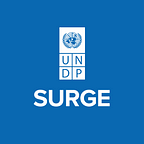Women of action: Leading in crisis
By Ioana Creitaru, UNDP Crisis Bureau & SURGE Advisor in Moldova
A loud bang on the door made her jump out of bed. Her husband asked her to stay back as he went out to check. Two soldiers barged in and took him under arrest. As he was dragged into the night, she refrained from screaming and rushed to wake up her children. She put a few clothes, jewels and a blanket in a heavy wooden case, whispered a prayer and fled with her two children. This was the last time she would see her husband and those were the last steps she took in her native land.
This is the story of my great-grandmother who fled as a refugee from Moldova to Romania in 1941.
Her story as a woman of action inspired me to become a development professional. This year, when UNDP announced the call for SURGE Advisors for the Ukraine refugee crisis response, I knew I had to go. My deployment to Moldova was not just a call of duty but an opportunity to honor my great-grandmother’s memory. Leaving my 4-year-old daughter was not easy, but strong family support and flexible mission arrangements with UNDP’s Crisis Bureau allowed me to take on this assignment.
Working with women refugees in Moldova
The war in Ukraine triggered the largest human displacement crisis in the world today. Around 8 million people have been displaced internally while 13 million are estimated to be stranded in affected areas or unable to leave. More than 6.5 million have fled the country as refugees. Almost half a million refugees crossed through to Moldova, and over 64 percent are women and girls. Out of these, 86,000 decided to stay! For perspective, Moldova’s population is 2.59 million.
When I arrived in Moldova, I met with women refugees in one of the 90 Refugee Accommodation Centers set up by the government. While children were entertained with songs by young volunteers, the mothers shared their worries about leaving their husbands on the frontlines, families and homes and the uncertainty of their future.
“When we left Odessa, we did not know where we would end up — we did not even know if we would survive the journey,” said Nataliya, holding her 5-month-old baby in her arms. Along with another 23 refugee women and 13 children, Nataliya found refuge at the Regional Centre for Rehabilitation of Victims of Domestic Violence in Gagauzia. Established two years ago to assist women and children exposed to violence, the UNDP-supported center offered available spaces to shelter mothers with small children forced to flee Ukraine.
Since 2019, UNDP and the Government of Switzerland have supported guesthouse owners to expand local businesses and promote rural tourism. In the aftermath of the current conflict, the program is also helping to defray some of the costs to shelter Ukraine’s refugees through the local hometown association. More than 150 refugees have received legal aid and psycho-social support under an access to justice program in collaboration with UNDP.
Overall, UNDP Moldova and its partners — EU, Switzerland, Sweden and the UK — have allocated US$1.27 million to partially cover the immediate needs of refugees and host communities, as well as support socio-economic inclusion of people fleeing the war by promoting employment opportunities, expanding their access to public services and ensuring social cohesion.
“I wanted to stay in Odessa, but my husband insisted that I leave for Moldova. So I came to Balti with our 11-year-old son,” said Tatyana, a refugee from Ukraine. She sought the services of the subdivision of the National Employment Agency and got a job at a sunflower oil production plant. UNDP and Switzerland support the Agency, which among other things, provides information, counselling and referrals to people looking for jobs.
Women who inspire
The Government of Moldova is showing leadership in responding to the needs of refugees fleeing Ukraine. Its effort is complemented by the efforts of partners that are coordinated by UNHCR under the Refugee Coordination Forum. UNDP Moldova is co-presiding, alongside with the Government, over the interagency inclusion and livelihoods sector group — and I felt honored to assume this role on behalf of UNDP during my SURGE mission.
Socio-economic inclusion, particularly that of women who represent the largest percentage of refugees, is a key determinant of a smooth transition out of the current crisis in Moldova. Getting it right will require a whole-of-society dialogue on solutions for employment, skilling and reskilling and childcare support systems.
In Moldova, I also got an opportunity to mentor a colleague, Nargiz Guliyeva, from UNDP Azerbaijan. She was deployed to Moldova under the SURGE Experience initiative that aims to prepare UNDP’s crisis professionals. She was supporting the country office on skills assessment, private sector engagement and other areas pertaining to socio-economic inclusion and livelihoods.
“This first SURGE assignment has allowed me to rediscover myself as a professional who can respond to the complexities of crisis and work under pressure in a multicultural environment,” Nargiz said.
As I reflect on this mission, I feel it was a privilege to work towards supporting women like my great-grandmother and the refugee women I met in Moldova. Although they faced unimaginable hardships due to conflict, they found inner and outer resources to not just survive but thrive and set an example for generations to come.
